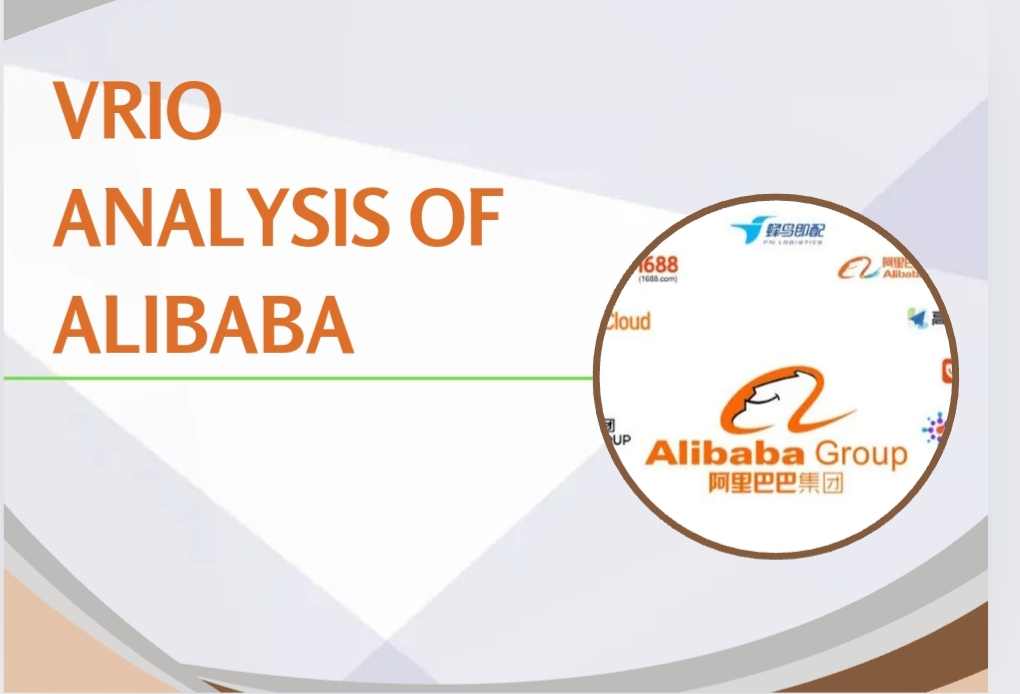A VRIO analysis of Alibaba provides a comprehensive framework for evaluating the company’s resources and capabilities to understand its competitive advantage and strategic positioning in the global e-commerce market. By examining Alibaba’s resources and capabilities through the lenses of Value, Rarity, Imitability, and Organization, we can gain insights into how the company leverages its unique strengths to achieve and sustain competitive superiority. This analysis will explore how Alibaba’s technological innovations, expansive market reach, and strategic partnerships contribute to its success and differentiation in a highly competitive industry, offering valuable perspectives on its long-term viability and strategic direction.
Table of Contents
ToggleValue Analysis of Alibaba
In the VRIO framework, the Value component assesses whether a resource or capability provides significant value to the company by helping it exploit opportunities or neutralize threats. For Alibaba, several key resources and capabilities stand out in terms of value:
- Extensive Ecosystem: Alibaba’s comprehensive ecosystem, which includes e-commerce platforms (Taobao, Tmall), cloud computing (Alibaba Cloud), digital entertainment (Youku), and logistics (Cainiao Network), creates substantial value by enabling synergies across its services. This integrated approach enhances customer experience, boosts cross-platform engagement, and facilitates efficient operations.
- Robust Technology Infrastructure: Alibaba’s advanced technology infrastructure, including its proprietary cloud computing capabilities and data analytics platforms, adds significant value. This technology supports scalable operations, provides deep customer insights, and enhances the company’s ability to innovate and respond to market demands quickly.
- Large Customer Base and Market Reach: Alibaba’s vast customer base across various platforms and its significant presence in both domestic and international markets provide considerable value. This extensive market reach enables Alibaba to leverage network effects, attract advertisers, and drive higher sales volumes, strengthening its competitive position.
- Strategic Partnerships and Alliances: Alibaba’s strategic partnerships with other global companies, including financial institutions and technology firms, enhance its value proposition. These alliances facilitate entry into new markets, drive innovation, and expand Alibaba’s influence and capabilities on a global scale.
- Brand Recognition and Trust: Alibaba’s strong brand reputation and established trust among consumers and businesses add considerable value. A well-recognized and trusted brand attracts users, encourages loyalty, and drives business growth, giving Alibaba a competitive edge in the e-commerce industry.
By leveraging these valuable resources and capabilities, Alibaba effectively capitalizes on market opportunities, enhances its operational efficiency, and maintains a strong competitive position in the global marketplace.
Rarity Analysis of Alibaba
In the VRIO framework, Rarity assesses whether a resource or capability is rare and not widely possessed by competitors. For Alibaba, several key resources and capabilities exhibit rarity:
- Comprehensive Ecosystem Integration: Alibaba’s ability to integrate a vast array of services—spanning e-commerce, cloud computing, digital media, and logistics—into a cohesive ecosystem is relatively rare. Few companies offer such a broad and interconnected suite of services, which enables Alibaba to create unique synergies and provide a seamless experience across different platforms.
- Advanced AI and Big Data Capabilities: Alibaba’s sophisticated use of artificial intelligence (AI) and big data analytics is a rare capability. The company utilizes these technologies to optimize its operations, personalize customer experiences, and drive innovation. While other firms use AI and data analytics, Alibaba’s scale and integration across its ecosystem provide it with a distinctive advantage.
- Massive Customer Base and Market Penetration: Alibaba’s extensive customer base and deep market penetration, particularly in China, are rare assets. The scale of its user base, combined with its extensive reach in both domestic and international markets, creates a competitive advantage that few rivals can match.
- Proprietary Technology Stack: Alibaba’s proprietary technology stack, including its cloud computing infrastructure and logistics management systems, is a rare resource. These technologies are tailored to Alibaba’s specific needs and provide it with a technological edge that is not easily replicated by competitors.
- Innovative Business Models: Alibaba’s innovative business models, such as its “New Retail” strategy that blends online and offline shopping experiences, are rare in the market. This approach revolutionizes retail by integrating digital and physical shopping, offering a distinctive value proposition that sets Alibaba apart from traditional and online-only retailers.
- Global Network and Partnerships: Alibaba’s extensive global network of partnerships and alliances with international companies and institutions is a rare resource. These relationships facilitate market entry, enhance its technological capabilities, and expand its global influence in ways that many competitors have not achieved.
By possessing these rare resources and capabilities, Alibaba is able to differentiate itself from competitors and maintain a leading position in the global e-commerce and technology landscape.
Imitability Analysis of Alibaba
In the VRIO framework, Imitability assesses whether a resource or capability can be easily replicated by competitors. For Alibaba, several key resources and capabilities are difficult to imitate:
- Ecosystem Integration: Alibaba’s extensive and highly integrated ecosystem of e-commerce, cloud computing, digital media, and logistics is challenging to replicate. The deep interconnection between these services, supported by years of development and investment, creates a complex system that competitors find difficult to imitate effectively.
- Advanced AI and Big Data Capabilities: While AI and big data technologies are available to many firms, Alibaba’s specific implementations and the scale at which they are applied are not easily imitable. The company’s proprietary algorithms, vast data sets, and the way it leverages these technologies across its ecosystem give it a unique advantage that requires significant resources and expertise to replicate.
- Brand Equity and Market Position: Alibaba’s strong brand recognition and established market position, particularly in China, are built over many years of operations and customer trust. This brand equity is difficult for competitors to imitate, as it involves not just marketing efforts but also consistent service delivery and customer satisfaction.
- Customer Base and Network Effects: The sheer scale of Alibaba’s customer base and the resulting network effects are challenging to replicate. The network effects created by a large and active user base enhance the value of Alibaba’s platforms, making it difficult for new entrants to achieve similar scale and impact quickly.
- Proprietary Technology and Infrastructure: Alibaba’s proprietary technology stack, including its cloud computing infrastructure and logistics systems, is developed specifically for its needs. The technological know-how, infrastructure investments, and customization involved make these capabilities hard for competitors to duplicate without substantial investment and time.
- Innovative Business Models: Alibaba’s unique business models, such as its “New Retail” strategy that seamlessly integrates online and offline experiences, are the result of extensive innovation and adaptation. While competitors can attempt to adopt similar strategies, replicating Alibaba’s success requires aligning various operational and strategic elements that are finely tuned to the company’s ecosystem.
- Global Partnerships and Alliances: The extensive global network of partnerships and alliances that Alibaba has built over time involves long-term relationship-building and strategic collaborations. Establishing similar partnerships and achieving the same level of integration and influence would require significant effort and time.
These imitable resources and capabilities contribute to Alibaba’s sustained competitive advantage by creating barriers to entry and making it challenging for competitors to match the company’s unique strengths and market position.
Organization Analysis of Alibaba
In the VRIO framework, Organization assesses whether a company is effectively organized to leverage its resources and capabilities to achieve competitive advantage. For Alibaba, several factors demonstrate its strong organizational ability:
- Integrated Business Structure: Alibaba’s organizational structure is designed to support its integrated ecosystem, which spans e-commerce, cloud computing, digital media, and logistics. The company’s ability to coordinate and align these diverse business units allows it to leverage synergies and optimize operations across its various platforms.
- Innovative Management Practices: Alibaba employs innovative management practices that facilitate rapid decision-making and adaptability. The company’s management structure, which includes a mix of centralized and decentralized elements, supports flexibility and responsiveness to market changes and technological advancements.
- Strategic Leadership: Alibaba’s leadership team, led by founder Jack Ma and his successors, has been instrumental in shaping the company’s strategic vision and execution. Effective leadership ensures that the company’s resources and capabilities are directed towards achieving long-term goals and maintaining competitive advantage.
- Technology and Infrastructure: Alibaba has invested heavily in developing and maintaining its technology infrastructure, including its cloud computing services and logistics network. The organization’s ability to manage and scale these technological resources efficiently supports its operational excellence and competitive positioning.
- Talent Management and Culture: Alibaba places a strong emphasis on attracting, developing, and retaining top talent. The company’s organizational culture promotes innovation, collaboration, and a customer-centric approach. By fostering a dynamic and motivated workforce, Alibaba ensures that its resources and capabilities are effectively utilized.
- Operational Efficiency: Alibaba’s organizational processes and systems are designed to enhance operational efficiency. The company’s supply chain management, logistics operations, and data-driven decision-making processes contribute to its ability to deliver high-quality services and respond swiftly to market demands.
- Strategic Partnerships and Alliances: Alibaba’s strategic partnerships and alliances are well-organized to support its global expansion and market influence. The company effectively manages these relationships to enhance its capabilities, enter new markets, and leverage complementary strengths.
- Customer-Centric Approach: The organization’s focus on customer needs and preferences drives its product and service innovations. By aligning its resources and strategies with customer expectations, Alibaba enhances its value proposition and maintains a strong market position.
By effectively organizing its resources and capabilities, Alibaba is able to maximize its competitive advantage, drive growth, and sustain its leadership position in the global market. This organizational strength ensures that the company can capitalize on its valuable, rare, and hard-to-imitate resources.


